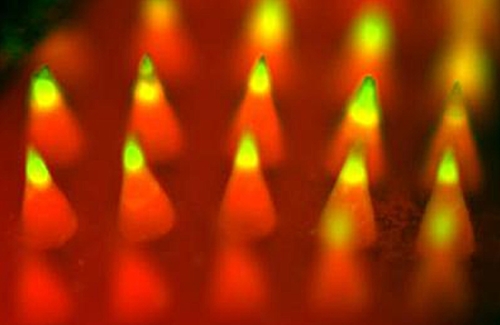
Fluorescence imaging of a microneedle patch to deliver cancer immunotherapy (Yanqi Ye, North Carolina State University)
25 March 2016. An engineering group created and tested in mice a patch with tiny needles that applies drugs stimulating the immune system to fight melanoma, an advanced form of skin cancer. The team from the lab of Zhen Gu, in a joint biomedical engineering program at North Carolina State University and University of North Carolina medical school, published its findings earlier this week (21 March) in the journal Nano Letters; paid subscription required.
Melanoma is an aggressive type of skin cancer, which while not as common as basal cell and squamous cell skin cancers, is more likely to spread to other parts of the body. American Cancer Society expects more than 76,000 people in the U.S. to develop melanoma in 2016, leading to some 10,000 deaths. If melanoma is caught and treated early, before it spreads or metastasizes, the 5-year survival rate is 98 percent. After the cancer spreads to other parts of the body, however, the 5-year survival rate drops to 17 percent.
Among the promising cancer treatments to emerge recently is immunotherapy that harnesses the body’s immune system to fight cancer cells. Tumors are able to defend against immune system attacks by expressing proteins that bind to receptors on immune system cells, enabling the cancer cells to hide from the immune system, and thus proliferate unchecked.
One way to expose cancer sells to the immune system is with specialized antibodies, known as anti-PD-1 antibodies that cut through the receptor-binding proteins on tumor cells, making the cancer a better immune-system target. When injected into the blood stream, however, anti-PD-1 antibodies do not always hit the target tumors. In addition, say the authors, too large a dose of anti-PD-1 antibodies can lead to disorders in the immune system, similar to autoimmune diseases that trick the immune system into attacking healthy cells and tissue.
To provide a more localized dose of anti-PD-1 antibodies, the researchers developed a biocompatible patch to apply directly to the cancer. The antibodies are combined with glucose oxidase that converts blood glucose to gluconic acid, and added to nanoparticles of dextran, a complex carbohydrate. These nanoparticles are then loaded into microneedles extruding from the patch, itself made from hyaluronic acid, a natural substance found in fluids in human joints and eyes.
When the patch is applied to melanoma tumor cells, blood enters the microneedles, with glucose in the blood converting the glucose oxidase to gluconic acid. That acid degrades the nanoparticles, releasing the anti-PD-1 antibodies directly into the tumor cells.
Gu and colleagues tested the patch on lab mice induced with human melanoma. The authors report 40 percent of the mice given a single patch with the antibody nanoparticles survived for 40 days and showed no signs of melanoma. None of a similar group of mice given anti-PD-1 antibodies injected one time into the blood stream, or even into the tumors directly, survived.
To boost the survival rate for the patch, the team combined anti-PD-1 antibodies with anti-cytotoxic T-lymphocyte antigen 4 or anti-CTLA-4, also known as checkpoint inhibitor antibodies that suppress signals limiting the immune system. This combination of anti-PD-1 and anti-CTLA-4 antibodies in the patch increased the number of surviving mice to 70 percent, which also detected no sign of melanoma after 40 days.
“Because of the sustained and localized release manner, mediated by microneedles,” says Gu in a university statement, “we are able to achieve desirable therapeutic effects with a relatively low dosage, which reduces the risk of autoimmune disorders.” Gu adds that his group is seeking funds for further studies, including human clinical trials.
Read more:
- Implant Developed to Deliver Alzheimer’s Immunotherapy
- Beta Cell Patch Designed to Control Blood Glucose Levels
- Hydrogel Injection Tested to Treat Advanced Artery Disease
- Patch Finds Heart Problems After Holter Monitor Period
- Sensor Quickly Detects Bacteria in Wounds
* * *

 RSS - Posts
RSS - Posts
You must be logged in to post a comment.